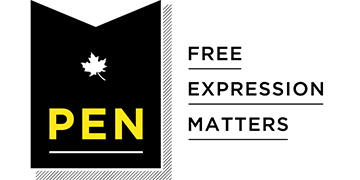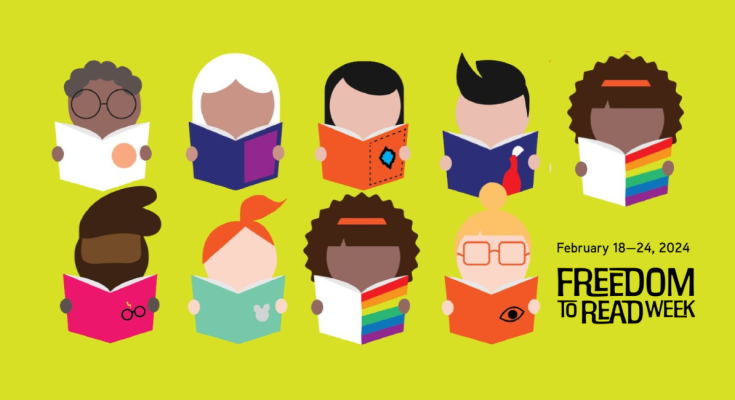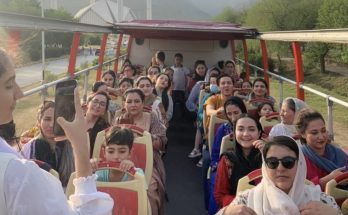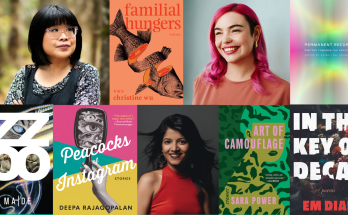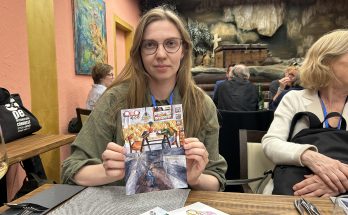By Jennifer Lanthier
A dramatic rise in book challenges and book bans targeting what are often called “diverse books” in children’s literature is sweeping North America.
While the bans are mostly seen as local issues in Canada, in the United States, the nation-wide scope of the rise has been well documented by PEN America and the Washington Post.
In a detailed examination of more than 1,000 challenges to books in school libraries, The Post found most challenges focused on books dealing with race, sex and gender, noting a fast-growing movement to ban “books that feature LGBTQ characters, storylines or themes.” Reporter Hannah Natanson found LGBTQ2S+ books accounted for 43 per cent of the books challenged and although almost half of challenged books were eventually returned to shelves, LGBTQ2S+ books were far more likely to be removed permanently or have access restricted.
Given the enormous size of the U.S. book market relative to the Canadian market, and the pervasiveness of U.S. cultural trends, what happens in the United States affects Canadian writers and Canadian books – as two critically acclaimed and popular children’s authors can attest.
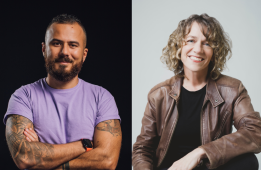
Danny Ramadan is an award-winning Syrian-Canadian author who writes for adults and children, an activist on behalf of refugees and the chair of the Writer’s Union of Canada. Robin Stevenson is the author of more than 30 non-fiction and fiction books for kids and teens whose many honours include the Sheila A. Egoff Award and the Lieutenant Governor’s Award for Literary Excellence. Both are members of the LGBTQ2S+ community whose children’s books have been challenged, banned, restricted, and depicted as dangerous in Canada and the United States – either because they include LGBTQ2S+ characters or because their authors are members of the LGBTQ2S+ community.
And both have seen the challenges or restrictions on their books dropped, after members of the community fought back. They shared some of the experiences and insights with retired children’s author and former PEN Canada board member Jennifer Lanthier:
PEN Canada: Salma Writes a Book is a heartwarming tale of a girl who’s thrilled and determined to be the best big sister ever, but she occasionally gets it wrong in amusing or nerve-wracking ways. The book beautifully weaves its themes of honesty, compassion and reconciliation beautifully – including its depictions of how Salma’s conservatively raised mother struggles in her relationship with Salma’s uncle, who is gay.
The book is so good it was included in the Ontario Library Association’s Forest of Reading program, ensuring it would be read by kids all across the province. But then someone tipped you off that one school board had subjected this book and three others on the Forest reading list that featured LGBTQ2S+ characters, to what is called a “shadow ban” – where it’s technically available in a library but access is severely restricted.
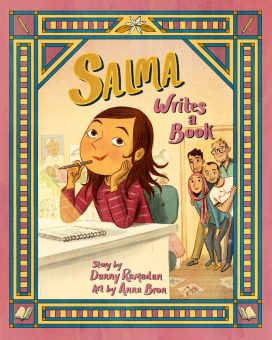 Ramadan: This was not my first Forest of Reading nomination – I got nominated for The Clothesline Swing and for Salma the Syrian Chef. When you’re nominated you know that your book is going to make an impact. Both those books received so much love and care from students over the years. So, when Salma Writes a Book was nominated, I was over the moon.
Ramadan: This was not my first Forest of Reading nomination – I got nominated for The Clothesline Swing and for Salma the Syrian Chef. When you’re nominated you know that your book is going to make an impact. Both those books received so much love and care from students over the years. So, when Salma Writes a Book was nominated, I was over the moon.
I was not informed directly about the shadow ban. Someone tweeted about it and then another author who had their book shadow-banned reached out to Robin who reached out to me… and I was confused at first, thinking, what does this mean, our books are on a ‘different shelf’?
In the beginning, all we had was a screenshot of a screenshot of an email, a blurry image. We barely had any information – I posted online, asking if someone works at this school board, can you please let me know what the actual email says? And someone shared screen shots of the actual email with the details of what actually happened.
We figured it out gradually and it felt like shock after shock after shock.
I thought, seriously? This can’t be happening. This is stupid as fuck.
I thought, this can’t be happening here in Canada. I mean, I expected this to happen in Florida, I expected this to happen south of the border. But I thought, it’s just not something we do here.
But I was sorely mistaken. Because it is something we do here, it’s something we have been doing for years and years. Through this experience I’ve gotten to know a lot of authors this has happened to… whose books have been banned in Canada because of the topics they wrote about, the things they care about.
We had this sort of “banned writers anonymous” group where we were sharing our sorrows and sadness over being banned. And of course I’ve known Robin all along, for ten years, and she’s the queen of being banned.
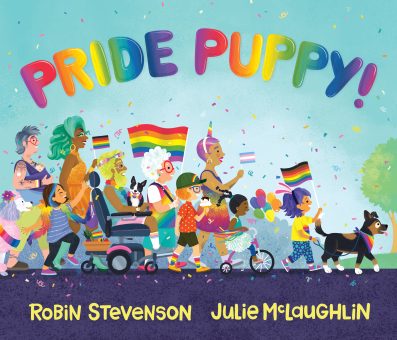
PEN: Robin, as Danny says, you’ve been dealing with this kind of thing for a very long time. The book at the centre of the maelstrom that I’m most familiar with is Pride Puppy – and for readers who don’t know it, this is a charming picture book of the alphabet variety, vibrantly illustrated by Julie McLaughlin, which tells the story of a dog who is briefly lost while attending a Pride parade. With lines like: “G for Grandma, at our meeting spot; H for hats and hungry and hot” it’s a wholesome, reassuring and frankly adorable book. But of course, the family is attending a Pride parade…
What happened when this book caught the attention of the American far-right, including broadcaster Fox News and a small but highly vocal and organized group with the fantastically Orwellian name of Moms 4 Liberty?
Stevenson: It was a bit surreal that so many people got really mad about a simple and joyful alphabet book! It started because Pride Puppy was named in a federal lawsuit by conservative religious parents who wanted the right to opt their children out of any LGBTQ+ content at their public schools in Maryland. The case got a lot of coverage in right wing media, and I got a lot of hateful messages as a result.
This situation didn’t start out as a book ban—in fact, the school district went to court to defend their right to use Pride Puppy and other diverse and inclusive books in the classroom, without having to inform all parents in advance of any occasion in which families like mine might get mentioned—but the book was widely lied about and misrepresented, with news headlines referring to the book as “Gay Sex Lessons for Kindergarteners” and so on. And of course, as a result of all that publicity Pride Puppy has now been challenged in other places, and most likely by people who haven’t even opened the cover.
PEN: When these challenges happen – at least, when they happen out in the open – we do see that other people will stand up for freedom of expression. Danny, once word got out about the Forest of Reading shadow bans, there was a huge outcry. We saw news coverage, your publisher released a statement, there was an open letter signed by hundreds of children’s authors to the Forest of Reading organizers, in protest over their handling of the issue And it seems like it had an effect: A few weeks later you learned the shadow ban was lifted.
Ramadan: I think they didn’t know who they were fucking with. I’m the chair of The Writers Union, I’m quite well-known in the media, I have lot of good connections, so generally speaking I don’t think they knew who they were dealing with.
The CBC podcast, Now or Never, was interviewing me about the banning. They reached out to the school board asking about the shadow ban and the board let them know the policy has changed. The board didn’t say when the policy changed. They didn’t make an announcement about the policy being changed. They just let the CBC know it had changed and the books are back on the regular shelves.
The question is, are they backing off because of who they’re dealing with, or are they backing off because they have fundamentally changed their values?
I wish the school board had reached out – they made my life a miserable hell for a good few weeks; a quick email would have been nice. And unless they acknowledge the whole process, talk about what kind of evolution they have gone through, I don’t trust that this has resulted in a meaningful impact. It just resulted in a quick email back to the CBC.
PEN: Robin, in the case of your board book Pride Colours, you saw an organized campaign opposing your book, and then you also saw those committed to freedom of expression organize to fight the challengers.
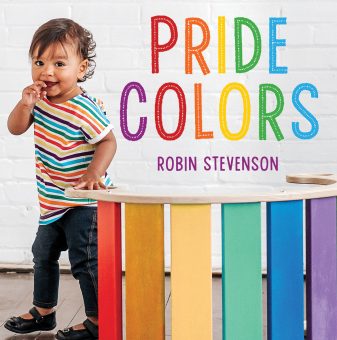
Stevenson: Yes, that’s right. In 2023, a group in Virginia actually held a book banning BBQ, offering beer and babysitting so folks could come and fill in book challenge forms, demanding that their town’s public library remove more than 130 children’s books with LGBTQ+ content. Pride Colors was one of them. It’s a color concept book that follows the colors of the pride flag, with lines like: “A bright red heart, a little star, I love you just the way you are” and it includes photos of babies, some of whom are shown with two moms or dads.
One of the book challenge forms that named it described it as “sexually explicit” while another called said it was “inappropriate for all children.”
In this case, the group also threatened the library, lobbying the county board of supervisors—at least one of whom had filled some of the book challenge forms himself—to withhold the library’s funding and putting it at risk of closure. After months of intense criticism and personal attacks, the library’s director resigned.
But the encouraging part of this story is that hundreds of people in the community came together to fight back. They refused to let their library to be used as a tool to rally religious voters at the expense of the queer community. It took months of hard work—a huge amount of time and energy and resources—but ultimately, they managed to save their library and keep queer books on the shelves. People are fighting back like this against book bans wherever they happen. Book banners are loud and often hateful- but the reality is that most people value libraries and do not support book banning.
PEN: Professor Rudine Sims Bishop explained decades ago that books can offer a child a window or sliding glass door to another world, another way of thinking or being – or they can provide a mirror in which children see their own experiences, thoughts and feelings, reflected. And, as the mother of a trans woman, I can’t tell you how hard I wish my daughter had been able to see herself in more books when she was growing up.
These days, book challengers tend to focus on books with LGBTQ2S+ authors or characters. They also target young adult books that make a very small group of white people feel uncomfortable or implicitly criticized. This could be anything where characters are not cis-gender, heterosexual, white, Christian, and anything related to racism, police brutality, discrimination, misogyny, abortion, colonialism, enslavement, the Holocaust, and more. So many Indigenous books – including works by Canadian authors – have been targeted in the United States that scholar and educator Debbie Reese has begun keeping a log.
What message is this small group of people sending children and young adults about the characters or ideas in your books?
Stevenson: These bans and challenges to my books are entirely based in homophobia and transphobia, and they are usually surrounded by blatantly homophobic and transphobic rhetoric. The message that sends is that people like me and that families like mine don’t belong in books, and that books that include queer people are somehow a danger to kids. That’s obviously a very harmful message to send. I recently spoke with a group of high school students about book bans: one thirteen-year-old observed that learning to hate yourself was far more dangerous than any book could ever be.
Book banners say that they want to protect children, but they are doing real harm to the very children they claim to protect.
Ramadan: It’s idiotic how villainized we are as queer folk. Gay uncles are so common – they have a word for it, a gunkle. And we love our nieces and nephews. It’s so confusing to me that my existence is seen as a threat, that there is this narrative that I’m trying to indoctrinate children into the queer world. I don’t have that kind of power. I can’t change someone’s sexuality.
I’m very proud of Salma Writes A Book. It reflects my own relationship with my own niece and it navigates something that I navigate all the time with my sister and her child. My sister is quite traditional and she wants to raise her child that same way. And my sister and I love each other very much, and at the same time, I’m married to my husband. We’re two completely different beings yet we exist in this beautiful space together and I was happy to have that seen and read and recognized.
My heart broke for my book and for its potential readers when I learned about the shadow ban. A school board is a voice of authority, it’s trusted by parents, and just the fact of the board saying this book should be restricted or shadow banned – that makes the parents think of me as the villain. They trust the school board and if it says Danny is X then Danny is X.
Stevenson: The decision to remove these books—or to shelve them in a part of the library students can’t access, as happened in Waterloo Catholic schools—tells students that there is something wrong, sinful or shameful about the identities the books represent. That in itself is harmful.
And when books with 2SLGBTQ+ characters are removed from the shelves, queer kids and kids from queer families don’t get to see their own lives reflected in the books they read, and other kids don’t get to learn about the diversity of the world they live in. For a queer teen—especially one whose family may not be accepting or supportive—a book can let them see that they’re not the only person in the world who feels the way they feel and let them know that there are many views and experiences and places beyond the ones they have grown up with. Books make more choices possible, and they can give kids and teens hope for the future. Queer books can be quite literally lifesaving.
Even though there may never be an official acknowledgement, the Waterloo Catholic School district changed its policy or approach because there was this enormous pushback. And that sent a message to other school districts that if you do this—if you censor books and discriminate against 2SLGBTQ+ kids in this way—you will hear from many people who oppose both book bans and bigotry in all its forms.
Ramadan: There are good reasons to limit books for children. Think of Mein Kampf – I don’t want a 12-year-old to read that book. And I don’t want a 12-year-old to read a smut book for example. I want a 16-year-old to be able to access a smut book if that’s what they want, if they feel they’re ready. A 16-year-old is old enough to know what’s real and what’s not. But a 12-year-old? No. So I completely agree that there are situations where you limit access to books depending on age, on maturity.
But you’re not banning me because I will harm the reader. A smut read by a 12-year-old would harm the reader. Salma Writes a Book will not hard the reader. Salma Writes a Book would teach a 12-year-old to be kind to their uncle.
PEN Canada: The Post investigation into book banning in American schools found that just 11 adults filed the majority of school book challenges. And as we’ve discussed, many people – from famous artists and activists to publishers and concerned citizens are fighting back. But clearly a small number of highly vocal and determined people can cause a lot of work for a lot of people.
In B.C. for example, the RCMP recently found itself investigating a complaint by the founder of an anti-vaccine, COVID conspiracy group known as Action4Canada that the Chilliwack School District was keeping child pornography in its libraries (per the RCMP: nope). And the Post reported a school board in Florida pulled dictionaries and encyclopedias from their shelves out of concern the words and facts they included ran afoul of a law. (PEN America and Penguin Random House are suing the board.) Are you concerned that school boards, public libraries, booksellers or publishers will act pre-emptively and take a more aggressive risk assessment approach to the books they publish, order or promote – even though most readers or buyers might have no issue at all with them?
Stevenson: Absolutely. The visible challenges are the tip of the iceberg but I think there is also a growing epidemic of silent censorship, or self-censorship that threatens access to books—and for authors and publishers, threatens book sales. The book challenges—and the homophobic, transphobic, racist backlash that we are currently seeing—are creating a climate of fear where some teachers and librarians are so worried about possible parental complaints that they are just avoiding books with any content that they think might be controversial. I think that all of us who care about kids, and books, and public education–and the freedom to write and publish and read—need to refuse these invitations to self-censor in this way. The climate of fear is a goal of the book banner, and if we give in to that fear, we do the work of the book banners for them.
Ramadan: I’m writing the fifth book in the Salma series now and the books are sold across North America. But who knows what will happen in the future?
With the school board, for example, it’s not like those books that were shadow banned are now and forever protected. It’s not like they can never re-shadow ban a book. It’s not like they can’t wait for another six months or a year and change their minds again.
And it’s not like I know they may buy my next book. I have Salma Joins the Team coming out in spring – will they buy that book?
They don’t need to shadow ban if they don’t buy the book in the first place.
PEN: Books for children and younger readers are typically sorted or age and maturity. And challengers will argue that kids might be distressed to read a book where a character experiences violence or trauma. But the books we’re talking about here are exuberant and uplifting. In Pride Puppy the worst thing that happens is the brief separation of the puppy and family. And while Salma Writes a Book makes it clear that the mother is being hurtful towards her brother, it emphasizes his enormous compassion and resilience, and the loving and accepting attitude of the other family members.
Were you surprised that your books were banned – or “shadow banned”?
Stevenson: No, I wasn’t surprised. I’ve been dealing with book challenges for years, and right now we’re seeing a huge escalation in book bans along with a vicious anti-queer backlash. It’s still heartbreaking and enraging and exhausting though.
My most targeted books are those for young kids, but my young adult non-fiction book, My Body My Choce: The Fight for Abortion Rights has also been challenged. In fact, most book challenges are aimed at books in high school libraries—these are books selected by librarians for people who are very nearly adults. Some of those books are of course about sex, or trauma, or grief—because these are part of life and included in much literature! It is beyond absurd to be restricting the reading of teenagers who are trying to learn about themselves, their rights, their bodies and choices, and about the world around them.
But whether the books are uplifting or tougher reads doesn’t seem to matter: if they include 2SLGBTQ+ or BIPOC characters and themes, they are likely to face challenges. If you look through the lists of books that are being banned, you’ll see book after book that has been challenged solely because the title indicates that it includes queer themes, or it has a Black kid on the cover, or it tells the story of a historical figure who fought for gay rights or civil rights. I’ve waded through hundreds of book challenge forms and so often, the challengers don’t even pretend to have read the book. Even when the Request for Reconsideration form asks, have you read this book? they often respond by writing, I read more than enough! or even just I don’t need to read this garbage. Once a book has been banned in one place, it often ends up on lists that are circulated online–along with out-of-context excerpts–by groups like Moms for Liberty and Action 4 Canada. And of course, that then leads to more bans in other places.
Ramadan: This is the first time I was banned in North America. I had a book banned in Singapore and my books have been banned in the Middle East, specifically in Syria – the regime over there.
We’re talking about a widespread practice – people are just banning books en masse – so it’s not like they’re looking through the books and thinking about the messages or the complexity of the messages. I don’t think this is how banning books goes. They’re banning our books without reading them.
PEN: How does all of this affect what you write or what you can publish?
Stevenson: It’s a huge distraction. Whenever one of my books—or a friend’s book!—is challenged or banned, I want to respond to that. I am committed to doing so as much as I can to speak up and to keep our books on shelves– but there is definitely a cost in terms of time and energy and focus. And in terms of publishing, I do worry: Are publishers going to keep buying books that have queer characters? What if sales tank because of all the bans? I know my publishers are committed to diverse books, but I also recognize that publishing is a business.
I have a book coming out this spring called Queer History A-Z: A Hundred Years of LGBTQ+ Activism. I do worry about it being challenged, and I worry even more about librarians being scared to buy it for their schools. But I can’t control either of those things! I think it is important history for young people to learn about, and hopefully the kids who need it will find it. For now, I’m going to keep writing what I want to write and I know there are lots of people out there working hard to make sure books like mine find their way to readers.
Ramadan: As authors we’re one bad sale away from being kicked out of the industry – if one book has bad reviews or bad sales, the next book gets a smaller advance, smaller marketing budget. So that makes us think twice if we include a queer character in children’s books because at the end of the day, I would like to pay my mortgage, I would like to go on living.
As a queer person of colour, I’m allowed one mistake and then I will be replaced by the next queer person of colour. I discuss this with my husband, we discuss our options, our Plan Bs.
But for me it feels like I’m the only bird on my tree. I’m the only one singing my song. I’m the only queer Syrian refugee writing in Canada right now. Because of that I find that I am quite interested in writing the queer story. I can’t be interested in writing the straight couple. Those books are everywhere. I’m going to write something that I feel will add to our Canadian literature.”
So, in exchange for having those plan Bs I will write what the fuck I want, and hope for the best. I will continue to write and if it doesn’t help to pay the mortgage then at least I tried.
PEN: Many of your works are categorized as “diverse” which places enormous weight on your shoulders. Every time a reporter needs to talk to an author about diversity or book banning – or someone organizes a panel, workshop or event on those topics, you must get asked for your time and insights. How do you find the time and energy to write?
Stevenson: Yes, I have joked that book ban panels are the new diversity panels! But I am happy to do them, and to talk to reporters, and so on—I think this is such an important subject to be talking about and I am always encouraged that so many people are making space for those conversations and boosting the voices of people speaking out against books bans and defending young people’s right to read.
And I am definitely still finding time to write. I have three non-fiction books coming out this year, a picture book and another non-fiction book next year, and a middle grade novel in 2026. And, after a long stint of writing mostly non-fiction, I am doing some final revisions on a YA novel about queer ghosts, which is a lot of fun!
Ramadan: I don’t walk around thinking of myself as a diverse person – when I wake up in the morning, my first thought is not that I’m a person of colour who is also queer who is also an immigrant – my first thought is I need coffee. Which I assume is pretty universal.
And I’m only diverse in relation to the context in which I exist – so when I lived in Syria, I was “diverse” in the context of being a queer person in a homophobic society. And when I came to Canada, the homophobia was reduced but I became a person of colour.
There’s a lot of work being done to diversify children’s literature that I’m really pleased about, and there’s a lot that’s just lip service and I’m not in support of. But when I run panels, I only run them with folks who are marginalized when I run events I only hire artists who are marginalized.
And I haven’t slept since 2004. So, I have Salma Joins the Team coming out in mid-March and I have the paperback of Foghorn Echoes and the German translations of Foghorn Echoes all coming out in March – and then in May, I have my memoir, Crooked Teeth, coming out with Penguin Random house in Canada.
Stevenson: I’m so excited for Crooked Teeth – I can’t wait!
Jennifer Lanthier is a writer and former wire service and newspaper reporter, speechwriter, magazine freelancer, and editor. The author of five children’s books, including The Stamp Collector, an award-winning picture book about freedom of expression, she resides in Toronto.
